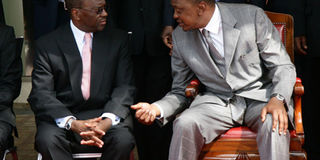Ultimately, Kenyans will pay the price of turf wars in government

President Uhuru Kenyatta (right) chatting with Chief Justice Willy Mutunga when he opened East African Judges and Magistrates meeting at Intercontinental hotel in Nairobi on October 14, 2014. PHOTO | BILLY MUTAI |
What you need to know:
- A government which is in a permanent state of flux cannot get much done.
- MPs, senators, and even governors have been ignoring court orders with increasing frequency and with impunity.
Lately, things have become very interesting on the political front. Our whole governance structure is rapidly becoming dysfunctional as we watch and applaud, an indication that Kenyans love nothing more than good theatre.
However, in the end, it is we Kenyans who will pay, but we don’t know it yet because when our rulers engage in high-decibel quarrels, we believe they don’t touch us, individually.
Well, they do. A government which is in a permanent state of flux cannot get much done. The three arms of government which, besides the National Executive, include the Legislature, and the Judiciary, seem to be on an irreversible collision course.
Let’s give concrete examples. On Tuesday, President Kenyatta opened the East African Magistrates and Judges Association’s Annual General Conference.
In the course of his speech, he expressed displeasure with the way judges have been issuing injunctions right, left and centre, thereby hobbling the functioning of the other arms of government.
Though he did not say they shouldn’t, he never left them in any doubt what he thought about the liberal manner in which they have been dishing out injunctions. Said he: “. . . The issuance of injunctive interim orders, especially ex parte, has undermined goodwill and harmony between the three arms of government.” That is quite an indictment, but it has a history and an explanation which anybody criticising the Judiciary should take into account.
For too many years, indeed, during Mzee Jomo Kenyatta’s rule, and more so during Daniel arap Moi’s 24-year period, the Judiciary was a mere appendage of the Executive.
TOTALLY DIFFERENT
In theory, it was independent, but in practice, no chief justice, judge or magistrate dared go against the wishes of the President or his clique. But today the opposite is true. If you cage a bird for too long, the day you open the door, it will definitely fly and in no particular direction. The same with an institution.
Whereas some people are convinced the Judiciary is now peopled by activists who will make rulings just to show how independent they are, judges and magistrates believe they are doing what they should have been doing all along.
This is because the Constitution has at last opened the cage door. But like the freed bird, they may be flying in no particular direction, thus trampling on the jurisdictions and functions of the other arms of government.
As a result, MPs, senators, and even governors have been ignoring court orders with increasing frequency and with impunity. Too much of anything is dangerous, and too many injunctions can be perilous for the rule of law. It is difficult, for instance, to understand how a man can be impeached twice by his MCAs, the decision endorsed by the Senate, and today he is still calling the shots in the governor’s mansion.
As for the Legislature, the incessant turf wars between the National Assembly and the Senate, the National Assembly and the governors who are in their own right, executives, the Senate against the same governors — all this is enough to make the mind reel.
The National Assembly, despite the vaunted “tyranny of numbers” which should make it the natural bed-fellow of the Jubilee government, has clearly shown it can act against the wishes of the Executive, and even against the Constitution, and get away with it.
The fact that in a bout of sophistry it amended the Standing Orders to pave the way for summoning Cabinet Secretaries in the face of opposition from the Attorney-General, State House, and even the Commission for the Implementation of the Constitution, is quite illustrative of the disdain with which it holds constitutional offices. If the AG and the CIC chief cannot interpret the Constitution for MPs, who can?
This activism, too, has its roots in the emasculation of Parliament in the first 39 years of independence when the Executive held sway. It is not easy, for instance, to imagine police officers going to Parliament to arrest an MP over his utterances, but it once happened.
Today, the democratic space has widened, but the price we have to pay is a spirited attempt by Parliament to replace Executive despotism with its own variety. The liberating spirit of the Constitution is being taken too far.
Our new rulers in Parliament are intoxicated with power, which is why they are chafing at the Judiciary or anybody else telling them to sober up.
As for the National Executive, it is so hamstrung by the Constitution that one wonders it can function at all. Though this may sound like anathema to many, one does at times become nostalgic for those days when the president would say something and not fear being silenced by a cacophony of insults. Even democracy, like everything else, should have its limits.





